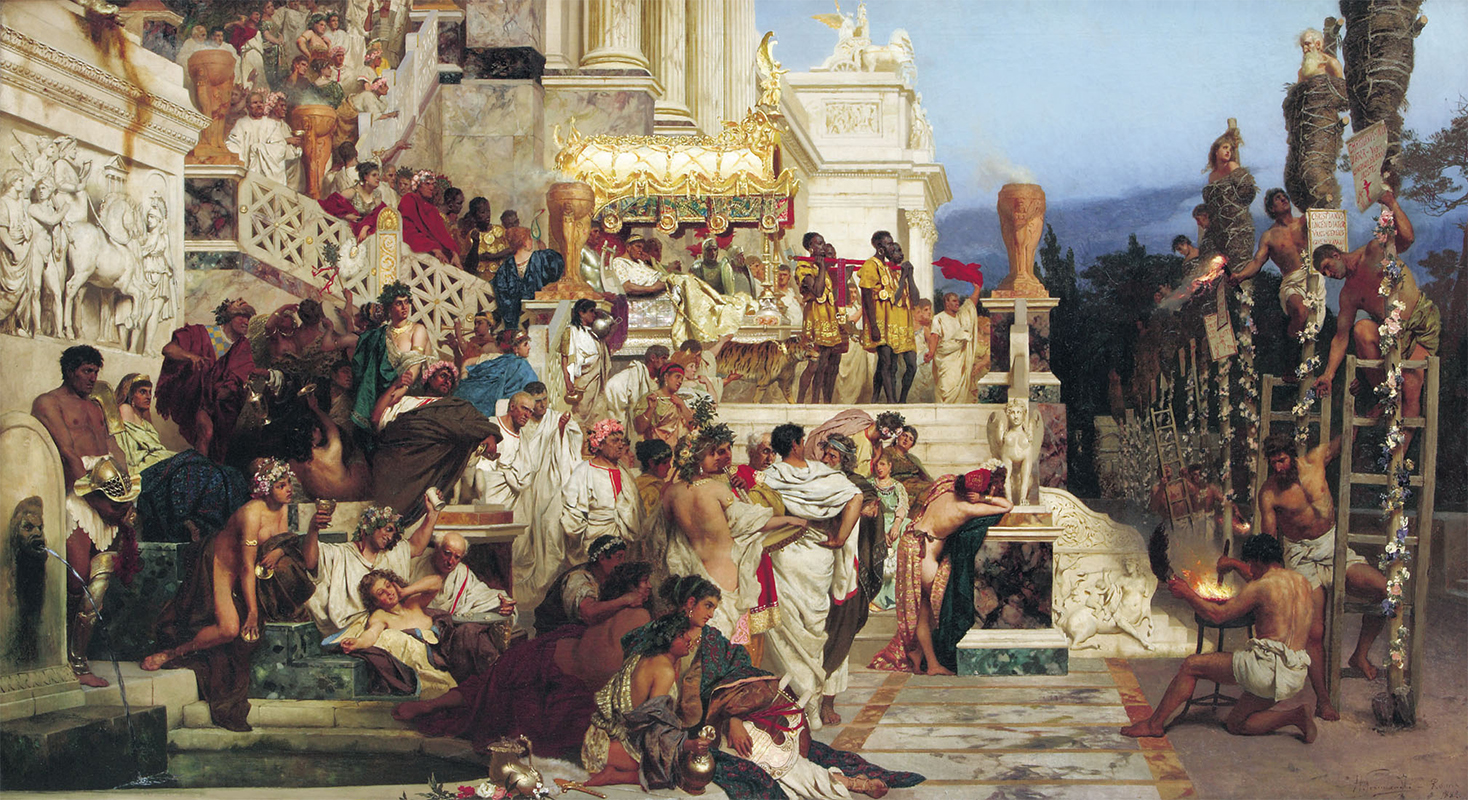This post is to bring into view the work of the apostle Paul as he brought the gospel to Jews and Gentiles in the first-century world of Asia Minor and Eastern Europe. More specially, Paul was appointed by Christ Jesus as an apostle to the Gentiles (1 Tim 2:7), and he fulfilled his mission with passion and strenuous attention.
Purpose and Background
With every bit of his mind, body, soul, and strength, Paul brought the message of reconciliation to God through Christ among people who were culturally alien to the messianic prophecies and the old covenants that extended back for generations. This post surveys the subject matter of Paul’s letters to the Romans. In his writing, he engages a people steeped in Greco-Roman culture with all of its pagan influences and Gentile customs of early gnostic and epicurean thought. The purpose of Paul’s letter itself cannot be narrowed to a single topic (i.e., systematic reasoning of God’s salvific power to the Gentiles). Paul wrote numerous additional matters of concern to the formative Gentile Church. Issues about the Church, humanity’s sin problem, God’s method of redemption, personal and shared holiness, sovereignty, ethnic cohabitation, and ministry work together inform the readers of Romans what principles to understand and abide in a life of hope and godliness.
Earlier in life, Apostle Paul was a Jew known as Saul of Tarsus (Acts 21:39), a province in Cilicia, southeast Asia Minor (modern-day Turkey). He was a tentmaker by trade who became a Pharisee and relocated to Jerusalem to live by the old covenant faith of Judaism. He was an educated man and a Jewish rabbi ardent in observing the Torah and tradition. The Torah of Moses was a focal point of his life, and he was devoted to the traditions of Israel. Paul was a rigorous student of the Torah as a Hebrew legal scholar under Gamaliel, a Jewish leader of his time (Acts 22:3). Paul’s achievements and status within his circles of Judaism earned him respect and admiration. His intellectual accomplishments and influence produced an authority recognized and accepted by Jewish religious leaders as necessary for his development and continuing work in Jerusalem and synagogues throughout Judea and various Mediterranean locales.
Paul was a Roman citizen by birth. A Jewish Roman citizen with status and privileges befitting a family of means. While his accomplishments were impressive and carried a significant weight of influence, he was of the tribe of Benjamin sealed as a Jew by circumcision (Phil 3:5). Moreover, as an official Roman citizen, he was recognized by the Roman and Israeli governments as a prominent social figure having cultural stature and notoriety. Paul was resourceful, driven, intelligent, strong-willed, persistent, and zealous. His convictions concerning the Torah and Jewish traditions were so fierce that he captured and prosecuted Christians of the emergent church in Jerusalem and Judea. While Paul did not accept Jesus’s status as the Jewish Messiah, he would come to know Him as the Christ of humanity to include Jews and Gentiles. Specifically, while Paul was on a journey from Jerusalem to Damascus toward Syria, Jesus appeared before him to confront his persecution (Acts 9:1-22). After His resurrection and ascension, Jesus revealed His identity to Paul as the risen Christ foretold. Paul’s direct encounter with Jesus confronted his understanding of Scripture, as he was very attuned to the experience of Jesus’ appearance as Messiah yet not to Pharisaic expectations. From within the Torah and across the various covenants down through the centuries, through divine encounter, Paul was granted mercy and a mission concerning what he must suffer and accomplish (Acts 9:15-16). Paul was converted from Judaism to Christianity in a flash of divine revelation while on the Damascus road.
Structure
As Paul was chosen to bear the name of Christ Jesus to the Gentiles, kings, and the children of Israel, his actions were guided and propelled by the Spirit to suffer hardships, form churches, shepherd God’s people, and write letters (2 Pet 3:16) to testify to the truth of the gospel, answer questions, and provide teaching. Accordingly, as Paul undertook his travels, he likely wrote to the Church of Rome by an amanuensis while in Corinth.1 The apostolic era of the early Church were recipients of direct verbal and written communication to shape their form of assembly and practice of faith according to principles and instruction concerning their development. Namely, the substance and body of Paul’s letter to the Romans were written in 56 A.D., while on his third missionary journey. His letter centers around doctrinal and practical concerns2 for the unification of the Church and furtherance of the gospel.
Doctrinal Concerns
Before delving further into the various sections of Paul’s letter, it is helpful to understand the circumstances around the hope of the gospel for both Jews and Gentiles. These were expressed as doctrines of depravity, sin, judgment, and the solution through a redemptive path. Involving justification, sanctification, and glorification of believers in Christ, God provides a way of reconciliation for eternal life and salvation. Those who accept and receive Christ Jesus by faith to include both Jews and Gentiles unified in the gospel. By one gospel as a reliable means of return to God through Christ Jesus, the Church of Rome was informed of what it meant to live by hope and grace to place individual and corporate confidence in Christ for reconciliation and escape from judgment due to the consequences of sin. Through the first eleven chapters of Romans, Paul precisely describes what this entails in thorough detail.
Practical Concerns
As Paul writes in contiguous form from the first eleven chapters, he informs the Roman Church about the day-to-day implications of fruitful godly living. Notably, in light of the redemptive work of Christ as a practical matter to any ethnicity. Together in the hope of the gospel, Jews and Gentiles transitioned to new lives as they set aside traditions, preferences, fears, and concerns about the requirements of the law, culture, and matters of conscience. In the face of religious and cultural baggage, interpersonal tensions and obstacles had to be overcome through peace and renewal of perspectives and attitudes applicable to each individual. Routine matters of fellowship, sharing meals, and work habits had to be resolved in light of the unity in the gospel and well-being of the Church.
Synthesis
Bringing together both doctrinal and practical concerns is rooted in the teaching of Paul as stipulations of the new covenant were formed as standards to live by. It just was not enough to become informed of principles concerning justification, righteous living, and their obligations to God and one another. The Church of Rome needed to know what was different and new and what was expected of them as they lived lives pleasing to God, befitting their faith and fruitful lives in the Spirit. It was necessary to practice what they learned and were taught as one people.
Introduction (Romans 1:1-17)
Paul’s credibility was necessary to establish before beginning his instructions to the Church. In doing so, he specifies his authoritative position as an apostle of God and servant of Christ set apart and appointed to inform others of the gospel and obedience of faith among all nations. In the opening comments to the Romans, he was explicit in greeting by way of encouragement and a longing to visit them from Corinth. As he intended to visit Rome, he was under obligation to Jesus Christ that he must preach the gospel to Gentiles elsewhere as well. Paul was committed to satisfying the expectations placed upon him. It was necessary to include the Greeks and Barbarians, and he informed the Church of Rome of such obligations while prevented from an earlier visit. Paul’s greeting followed an epistolary format of salutation that explicitly informs the reader of the gospel, Christ the Son, Scriptures, Paul’s gospel, the obedience of faith, and the name and glory of God.3
The Problem of Depravity & Judgment (Rom 1:18–3:20)
As Paul wrote that “the righteous shall live by faith” (Rom 1:17), he contrasts that state of being with God’s wrath upon the unrighteous. Paul articulated the infamous Romans 1 passage about everyone lost in sin with observations concerning the culture at the time. Both Jews and Gentiles of first-century Rome were indicative of unrighteous people and ungodliness in suppression of the truth. Contrary to the evidence of God’s existence through creation and His divine attributes, people exchanged the truth about God for a lie and worshiped creatures instead of God the Creator. The consequences of self-delusion, error, and degrading passions led people into depravity to remove them from a desire for the Creator and truth. Instead, people become filled with evil and thoroughly opposed to natural order and righteousness.
As given over to unrighteousness, covetousness, and malice, the sin itself involves envy, murder, strife, deceit, gossip, slander, hatred, insolence, arrogance, conceit, disobedience, dishonor, foolishness, faithlessness, heartlessness, and cruelty. As indicative of Greco-Roman culture, people who deny Truth and God their Creator were and are desperately lost while subject to God’s righteous judgment. Without recourse, the problem was a staggering loss of peace, order, and a common harmony with one another and God to fill a purpose of contentment and life to glorify God and love Him and each other as designed and intended.
The judgment of God involves a “giving over” people to their sinful and erroneous interests (cf. Rom 1:24, Acts 7:42).4 The suffering and misery of people that ensues as an outcome of depravity and evil conduct is a manifestation of hardships and distress in physical life that was certain and against the created order of humanity. The passive and foreboding wrath of God actively against humanity engaged in the error and depravity constitute the sinfully lost disposition. Enmity with God involved depraved people who were subject to judgment as anyone without Christ is lost in sin.
Paul further elaborates on the truth that sinful people cannot mitigate the judgment of God by their efforts. Following and abiding by the law in an attempt to satisfy God’s requirement for righteousness was a futile undertaking (Rom 3:19) because if anyone offends in one point of the law, then there is the guilt of the whole law (Jas 2:10). Paul makes it clear to the Church that God’s righteousness solves the problem of sin as no one is righteous and fit to stand before God in judgment. While there is condemnation upon those separated from Him due to sin, there is no way for an individual to make up for offenses. The deep corruption of all humanity laid bare before God was a debt paid through Christ regardless of individual merit, ethnic status, or nationality (Rom 3:1-4). It was God’s righteousness as the intervening solution to humanity’s sin problem that required judgment and wrath. No person can be justified before God by works of the law as the corrupt nature of everyone involves an inevitable rejection of God by knowledge of sin. An absence of the fear of God reveals to those who violate His law all unmet obligations to cement their condemnation before Him without Christ.
Righteousness from God’s Justification (Rom 3:21–5:21)
While everyone is conscious of sin, whether later suppressed or not, everyone has sinned and fallen short of the glory of God (Rom 3:23). The law makes the need for faith evident, and it is a witness to our fallen condition apart from Christ. Therefore, the law in Paul’s mind performed a positive function in this way as it pointed to Christ.5 More explicitly, the imputation of faith to believers for righteousness through God’s forbearance. Faith is imputed for righteousness, counted for righteousness, and reckoned for righteousness by God’s righteousness (Rom 4:3, 5, 9, 22, 24).6 Paul brings attention to the authority of Scripture to make clear Abraham’s Justification before God by faith. “Abraham believed God, and it was counted to him as righteousness” is declared in Scripture to highlight the principle of faith to become made righteous.
Abrahams’s righteousness was counted to him without considering what he accomplished through performance or circumcision in an effort to earn God’s favor. As circumcision was a seal for all those who believed, he was made the father of faith for all without being circumcised. The seal of circumcision itself was a covenant indicator of distinction for righteousness by faith to count for others. While there was the presence of sin and guilt upon Abraham and those of the seal of circumcision, faith in God was the means of their justification for right standing with God and salvific righteousness. Justification by faith as righteousness is a claim for all believers validated by Paul from the authority of Scripture. Paul makes vividly clear that believers who are the spiritual offspring of Abraham (Gal 3:29) are people in Christ as heirs according to the guaranteed promise of God (Rom 4:16). Those who share in Abraham’s faith and believe God participates in justification by faith about God’s promise, “so shall your offspring be” (Gen 15:5).
Paul further elaborates to the Roman Church that faith’s intended effect of justification is peace with God. Achieved by the Lord Jesus Christ, access to God is obtained as He died for the ungodly. The death of Christ to redeem people of faith made righteous was to bring to God heirs of inheritance according to His promise. As the blood of Christ (Rom 5:9) justifies the redeemed, His people are saved from the wrath of God. As the cost of this work of redemption is far beyond human wisdom and comprehension, God gave up His Son for reconciliation.
Furthermore, Paul stressed that once believers are reconciled, they are saved through the life of Christ (Rom 5:10). This free gift of reconciliation to escape condemnation is the gospel hope for all only in Christ. To live in Christ by grace made possible through His sacrificial death, burial, and resurrection, where believers are made righteous by faith.
Holiness and Sanctification (Rom 6:1–8:39)
Paul’s letter to the Romans transitions from justification to sanctification as he instructs believers about holy and righteous living. Where people of faith were formally slaves to righteousness, he urges them to present their bodies as slaves to righteousness leading to sanctification (Rom 6:19). While people were set free from the slavery of sin through the gospel, the righteousness lived leads to sanctification, ending in eternal life.7 Grace as an active ingredient appears as a functional impetus at work in the life of a believer. To affect a drive toward individual sanctification as people transition from slaves to sin to slaves of righteousness. Grace, in this sense, is not a passive activity that allows for God’s favor or merit to override the presence of sin. It is an active ingredient in the catalyst of sanctification.
Free from condemnation, believers in Christ are no longer under the law but under grace. As promised, any person given eternal life is righteous by faith and free from the law. More specifically, freedom from the law correlates to freedom from condemnation as believers under grace are united in Christ to bear fruit and live by the Spirit. Those in Christ are cut off from the law and bound to grace as a husband’s death releases a woman from one covenant to render her bound to another in marriage.8
While those in Christ are free from sin, the struggle against sin continues because while a person belongs to God, that person still lives in the body where sin dwells. The law is righteous and holy, but sin itself within produces death. As the law is spiritual, that law of sin in the flesh holds us captive. The struggle with sin is the person’s bodily flesh waging war with the inner being or spirit of those in Christ. Aurelius Augustin further expressed this condition as the carnality of the mortal body “sold under sin” (Rom 7:14) until the spiritual body is clothed in immortality.9 Until physical death, therefore, as it is of those in Christ, Paul served the law of God with his mind to bear fruit, yet in his flesh, he served the law of sin.
As those in Christ by the spirit inhabit the flesh subject to death, believers walk by the Spirit. That is, to set the mind on the Spirit where there is life and peace. Living and walking by the flesh is enmity with God, and it cannot submit to God’s law. Conversely, righteousness that abides in the believer is made alive to the Spirit as the body is dead because of sin. As by the Spirit, the deeds of the flesh are put to death, then by the Spirit, those in Christ will live. This hope was made possible by the love of Christ to bring us into union and fellowship with him.
The Sovereignty of God (Rom 9:1–11:36)
Paul distinguishes the children of the flesh and children of the promise. There are children of Israel according to the flesh, and there are the children of Abraham according to the promise (Gal 4:23). He elaborates on the difference between the flesh and the promise to bring into view the wisdom and sovereignty of God through “vessels of wrath” (Rom 9:22) and “vessels of mercy” (Rom 9:23). The declared “sons of the living God” (Rom 9:26) is in contextual reference to the adoption as sons (Rom 8:23) as heirs of the promise. As those in Christ justified by faith walk in the Spirit, they are reckoned righteous and heirs to eternal life. The sovereign difference between the children of the flesh and the children of the promise is between those in Christ and those who are not.
The believers within the first-century Roman Church were informed of these doctrinal concerns to contrast between the belief and unbelief of Jews and Gentiles. To the Gentiles, righteousness is pursued by grace through faith that produces fruit. With the Jews, righteousness is pursued by works of the old covenant law. Within the new covenant context, by the sovereignty of God, the children of promise and children of the flesh are regarded intentionally separate through the “rock of offense” of Christ, who God placed upon His old covenant people.
Israel’s unbelief does not preclude their ultimate justification and reconciliation to God. It is through their trespass salvation has come to the Gentiles (Rom 11:11). God does as He wills between the elect and the justified (Rom 9:11-24) in His redemptive plan to bring people to Him through Christ. It is along a span of time that people become reconciled either as Jews or Gentiles through faith in Christ as made present for purposes of justification and righteousness. Salvation unachievable by the law, Israel was hardened by a rejection of the gospel as God’s sovereign means of their corresponding redemption across covenantal periods. Israel will eventually be restored and reconciled, but until that time, the sovereign work of God prevails.
Renewed Life & Mind (Rom 12:1-2)
Paul again transitions to an appeal to the Church. Predicated upon his discourse concerning the sin problem of Jews and Gentiles, he makes clear the mercies of God through the gospel. For all in Christ who believe, His people are called to faith for justification and righteousness, whether Jew or Gentile, to become reconciled to God. While there is life in the body of flesh, sanctification is the spiritual course of life in the Spirit. The work of God between unbelief and belief among Jews and Gentiles is a sovereign work alongside the redemptive accomplishments of Christ. The inclusion of Israel will be saved and restored (Rom 11:1-32), but until then, Gentiles are ushered into belief and justification for God’s good pleasure and for those who would believe.
It stands to reason that those in Christ should present their bodies of flesh as a sacrifice to God. Spiritual service as a form of worship is a rational endeavor in the life of the Spirit. Romans 12:1-2 is a prelude and theme to the remainder of what Paul’s letter concerns.10 The life of a believer should be devoted to the service of others as a means of living by the Spirit. Made evident in the believer’s life by the Spirit are the fruits of the Spirit. As Paul wrote to the believers in Galatia (Gal 5:1-26), the fruits of the Spirit yield positive and meaningful character and work toward individual conduct and the life of a body of believers.
In contrast to the works of the flesh that come into opposition to the life of the Spirit, Paul charges believers to renew their minds. Where it becomes necessary to recognize and follow the will of God, this involves a transformation of priorities and values in keeping with a change of heart and mind holy, acceptable, and pleasing. The freedom that belongs to those in Christ renders to them the capacity to serve God and people by the Spirit from a renewed life.
Life of Peace, Unity, & Love (Rom 12:3-13:14)
As Paul’s discourse transitions from doctrinal concerns to practical concerns, he sets course to write specifics about what believers are to do by faith through grace. With a renewal of mind and life by the Spirit that gives way to service and worship, behavioral principles for Godly living become a daily practice. Numerous examples of such performative outcomes result from gifts “assigned” by God (Rom 12:3). Functions within the church that metaphorically compare to the body of a person represent the necessity and purpose of its various members. Suppose a concern or dispute should surface about one church member being more important than others. In that case, Paul communicates the unity of the body as its diverse members achieve a given purpose. As Paul addressed in 1 Cor 12, a diversity of gifts must be honored. Otherwise, members could become tempted to compare each other with false pride.11
Further practical instructions were written to the Romans and for believers today. The marks of a Christian include living at peace with one another. Furthermore, Paul instructs those in Christ to live in peace with society and authorities. There is no ambiguity about what positive attitudes and inner motivations must become externally evident toward others. Living in submission, harmony, cooperation, and gratitude are necessary Christian dispositions. It is contradictory to the life of peace, unity, and love to live contentiously with people. Christians are called to live by faith and walk by the Spirit both inwardly and outwardly.
As love is a fruit of the Spirit, Paul makes it evident that the love of one another fulfills the law (Rom 13:8). Accordingly, those in Christ are urged to cast off “works of darkness” that bring harm to others through the gratification of the flesh. Such behavior is incompatible, whether by immoral conduct, undue abrasive attitudes, or verbal animosity and abuse.
Conscience, Discernment & Deference (Rom 14:1-15:13)
Paul further narrows his instructions to the church in Rome concerning the presence and diversity of new believers and Jews among them. Explicit guidance is given to believers in Christ about unity within the church, and Paul was precise concerning the conscience of people who object to acceptable yet divergent faith practices. The opinions of some people who were weak in faith were not to be disputed or accused of stringent rules around meals or the abstention from valued traditions. Paul’s concern amounted to the spiritual preservation of believers and Jews who were in the presence of Christians that appeared to violate people’s conscience and not just their preferences or tastes. More seasoned and mature believers were warned about causing others to sin by violation of conscience. And Paul’s tone is severe in the matter as he verbally brought to mind the inevitable judgment of God by which everyone must stand (Rom 14:10). It is abundantly clear that each person must give an account of themselves to God.
To sin against Christ was to cause a brother or sister in the Lord to violate their conscience (1 Cor 8:13). It was Paul’s exhortation that Christian’s strong in the faith must not destroy the work of God in the lives of fellow believers. Inconsiderate exercise of freedom in eating anything at-will could distress the ‘weak’ and lead them to act against their consciences, thus causing shipwreck of their faith.12 The ‘strong’ who would destroy the work of God in the lives of the ‘weak’ merely for the sake of food were not living according to the principle of love Paul earlier wrote about (Rom 13:10). To pass judgment on fellow believers or grieve them by what others do in their freedom of conscience by faith is unacceptable and counterproductive.
Method & Ministry (Rom 15:14-33)
Paul wrote to the church in Rome to express his satisfaction with them. He acknowledged their advanced development in the gospel. Their goodness and knowledge had matured where they could instruct one another without undue burden or strife. It is apparent that Paul delighted in their growth as believers in Christ as he shared his confidence in them by what he accomplished and valued. Inclusive to their place in the Kingdom of God, Paul had fulfilled his ministry. From Jerusalem all the way to Illyricum (modern Yugoslavia) to the North of the Adriatic Sea, Paul reached yet further people beyond the rim of the Mediterranean. Paul’s recorded missionary journeys extended farther and farther in duration to ensure the fulfillment of Christ’s commission. Namely, to bring the Gentiles the gospel and obedience by word and deed (Rom 15:18). Location after location, Paul planted churches and formed them with believers in Christ to involve fellow ministry workers. Paul’s work of the gospel of Christ was an epic undertaking to which God obtains the fullest measure of glory.
Paul’s affection for the church in Rome was a pleasing experience. Their spiritual blessings translated to material blessings of welcomed support for furtherance of the gospel and Paul’s ministry work in Jerusalem and later toward Spain if he were to reach that far. As Paul began to conclude his written discourse, his appeal for prayer was on his mind as safety from the Church was concerned.13 He knew that he would encounter conflict once he arrived in Jerusalem, and he desired deliverance from people opposed to his work further West toward Spain. As his work in the region ended, Paul sought to further the gospel. He hoped to gain the favor of the saints in Jerusalem for continued support and encouragement.
Final Commendations & Farewell (Rom 16:1-27)
The closure of the letter to the church at Rome is a roster of greeting to acknowledge numerous people active in the faith. Its length is unique and comprehensive as the people that Paul personally greeted were a listing of notable figures involved in the work of ministry and the church’s growth. While the identities of each person were explicit by name, various contributions and associations among the saints were made clear. The roster also somewhat served as a listing of risks undertaken by first-century prisoners and missionaries of the Church alongside Paul. Behind each of the names made apparent in the letter is a notable person responsible for the advancement of the Kingdom.
Paul’s final appeal was written in the form of instructions. He warned the church in Rome to guard against people who would stir up divisions and obstacles that contradict the doctrines they were taught. Paul’s doctrinal concerns through the first eleven chapters of his letter were not up for contravening opinions or perspectives. The teachings of Paul to the Romans and the churches throughout Asia-Minor were a work of collaboration from among additional apostles and their disciples to assure a lasting and coherent belief. The strengthening of the saints according to the gospel and the preaching of Jesus Christ was in bloom for the world to witness. Paul’s heartfelt interest was toward the obedience of faith to the Gentiles. It was and is for the glory of God through Christ Jesus for all eternity.
Conclusion
The apostle Paul’s ministry and his passionate written letter to the church in Rome is an incredibly beautiful expression of spiritual significance. The direct inspiration and active involvement of the Holy Spirit is the only viable explanation for its meaning and purpose. As the letter to the Romans is intended for mature believers in Christ, it is a tenderhearted work of profound importance. While it is intellectually rich, a reader of the letter cannot escape the plain content of the text. The surface of the letter as constituted by words assembled without further depth is in itself unspeakably heartwarming. As the letter speaks to the inner being about truth and the work of God through Christ Jesus, it is impossible to miss the joy and peace that comes with its message. The gospel of Christ is a treasure, and the love of God through the Lord Jesus is of incomparable worth.
The comprehensive nature of the letter as a guide for doctrinally sound theology and Christian living is undeniable. While the text of the letter is specific to the church in Rome, it has immeasurable value to those in Christ. Those who wish to probe the depths of justification, sanctification, righteousness, faith, grace, unity, and many other topics of crucial necessity, will never fully exhaust the wonder of God’s love, wisdom, and sovereignty.
Citations
1 F. F. Bruce, Paul: Apostle of the Free Spirit (Milton Keynes, UK: Paternoster, 1977), 16.
2 M. Scott Bashoor, Visual Outline Charts of the New Testament (B&H Academic, 2016), 44.
3 Crossway Bibles, The ESV Study Bible (Wheaton, IL: Crossway Bibles, 2008), 2157.
4 William Arndt et al., A Greek-English Lexicon of the New Testament and Other Early Christian Literature (Chicago: University of Chicago Press, 2000), 762.
5 Scott Hafemann, “Review of Paul, the Law, and the Covenant by A. Andrew Das,” Trinity Journal 25, no. 2 (2004): 265.
6 John Miley, Systematic Theology, Volume 2 (New York: Hunt & Eaton, 1893), 319.
7 Mark A. Seifrid, “Romans,” in Commentary on the New Testament Use of the Old Testament (Grand Rapids, MI; Nottingham, UK: Baker Academic; Apollos, 2007), 631.
8 C. E. B. Cranfield, A Critical and Exegetical Commentary on the Epistle to the Romans, International Critical Commentary (London; New York: T&T Clark International, 2004), 333.
9 Augustine of Hippo, “A Treatise against Two Letters of the Pelagians,” in Saint Augustin: Anti-Pelagian Writings, ed. Philip Schaff, trans. Robert Ernest Wallis, vol. 5, A Select Library of the Nicene and Post-Nicene Fathers of the Christian Church, First Series (New York: Christian Literature Company, 1887), 383.
10 Thomas R. Schreiner, Romans, vol. 6, Baker Exegetical Commentary on the New Testament (Grand Rapids, MI: Baker Books, 1998), 649.
11 Douglas J. Moo, The Epistle to the Romans, The New International Commentary on the New Testament (Grand Rapids, MI: Wm. B. Eerdmans Publishing Co., 1996), 763.
12 Colin G. Kruse, Paul’s Letter to the Romans, ed. D. A. Carson, The Pillar New Testament Commentary (Cambridge, U.K.; Nottingham, England; Grand Rapids, MI: William B. Eerdmans Publishing Company; Apollos, 2012), 524.
13 John Chrysostom, “Homilies of St. John Chrysostom, Archbishop of Constantinople, on the Epistle of St. Paul to the Romans,” in Saint Chrysostom: Homilies on the Acts of the Apostles and the Epistle to the Romans, ed. Philip Schaff, trans. J. B. Morris, W. H. Simcox, and George B. Stevens, vol. 11, A Select Library of the Nicene and Post-Nicene Fathers of the Christian Church, First Series (New York: Christian Literature Company, 1889), 549.
Bibliography
- Bashoor, M. Scott. Visual Outline Charts of the New Testament. Nashville, TN: B&H Academic, 2016.
- Bruce, F.F. Paul: Apostle of the Free Spirit. Milton Keynes, UK: Paternoster, 1977.
- Chrysostom, John. “Homilies of St. John Chrysostom, Archbishop of Constantinople, on the Epistle of St. Paul to the Romans.” In A Select Library of the Nicene and Post-Nicene Fathers of the Christian Church, First Series, vol. 11, by trans. J. B. Morris, W. H. Simcox, and George B. Stevens ed. Philip Schaff, 549. New York: Christian Literature Company, 1889.
- Cranfield, C.E.B. A Critical and Exegetical Commentary on the Epistle to the Romans, International Critical Commentary. London: T&T Clark International, 2004.
- Crossway Bibles. The ESV Study Bible. Wheaton: Crossway Bibles, 2008.
- Hafemann, Scott. “Review of Paul, the Law, and the Covenant by A. Andrew Das.” Trinity Journal 25, no.2, 2004: 265.
- Hippo, Augustine of. “A Treatise against Two Letters of the Pelagians.” In A Select Library of the Nicene and Post-Nicene Fathers of the Christian Church, Saint Augustin: Anti-Pelagian Writings Vol. 5, by trans. Robert Ernest Wallis ed. Philip Schaff, 383. New York: Christian Literature Company, 1887.
- Miley, John. Systematic Theology. New York: Hunt & Eaton, 1893.
- Moo, Douglas J. The Epistle to the Romans, The New International Commentary on the New Testament. Grand Rapids: Wm. B. Eerdmans Publishing Co., 1996.
- Schreiner, Thomas R. Romans, vol. 6, Baker Exegetical Commentary on the New Testament. Grand Rapids: Baker Books, 1998.
- Seifrid, Mark A. “Romans.” In Commentary on the New Testament Use of the Old Testament, by G.K. Beale and D.A. Carson, 607-694. Grand Rapids: Baker Academic, 2007.
- William Arndt, et al. A Greek-English Lexicon of the New Testament and Other Early Christian Literature. Chicago: University of Chicago Press, 2000.























